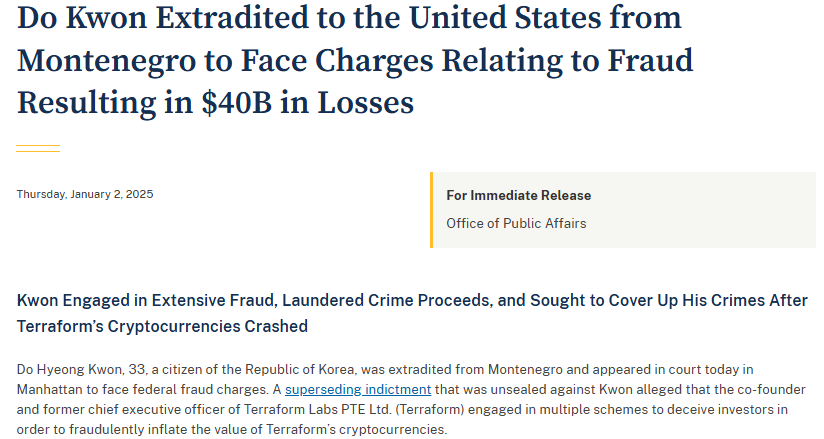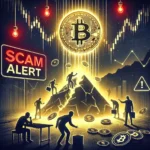Introduction
Do Kwon, once celebrated as a cryptocurrency innovator, now embodies the industry’s volatility and susceptibility to fraud. As co-founder of Terraform Labs, Kwon drove the creation of the Terra/LUNA ecosystem, promising stability through its algorithmic stablecoin, TerraUSD (UST). The catastrophic collapse of Terra/LUNA in May 2022 erased an estimated $40-60 billion in market value, devastating investors and sparking a global crypto market downturn. Kwon’s flight from justice, culminating in his March 2023 arrest in Montenegro for using a forged passport, triggered a complex legal battle over his extradition. On December 31, 2024, Montenegro’s Justice Ministry, following court rulings, finalized Kwon’s extradition to the United States, rejecting South Korea’s competing request. This decision, steeped in allegations of fraud, political entanglements, and systemic failures, reveals the murky undercurrents of cryptocurrency’s promise. This risk assessment and consumer alert examines Kwon’s alleged misdeeds, the red flags in his conduct, and the broader lessons for investors and regulators navigating an industry prone to unchecked ambition.

Background on Do Kwon and Terraform Labs
The Terra/LUNA Vision
Founded in 2018 by Do Kwon and Daniel Shin, Terraform Labs aimed to redefine finance through blockchain technology. Headquartered in Singapore, the company developed the Terra blockchain, which powered TerraUSD (UST), a stablecoin designed to hold a $1 peg via an algorithmic balance with its sister token, LUNA. Kwon’s vision of a decentralized financial system garnered massive investment, with UST and LUNA peaking at a combined market value of over $50 billion by early 2022.
Kwon’s Rise to Prominence
Kwon’s bold persona amplified Terraform’s appeal. Active on platforms like Twitter, he positioned himself as a crypto trailblazer, dismissing skeptics with bravado. Posts on X from 2021 show him mocking critics of Terra’s stability, a stance that later fueled backlash when the ecosystem crashed. His confidence attracted a cult-like following but also scrutiny from regulators and analysts wary of Terra’s untested model.
The Catastrophic Collapse
In May 2022, TerraUSD lost its peg, triggering a cascading failure that obliterated LUNA’s value. Investors lost billions, with estimates ranging from $40 billion (U.S. figures) to $60 billion (South Korean estimates). The collapse rippled across the crypto market, contributing to bankruptcies of firms like Three Arrows Capital and BlockFi. Allegations quickly surfaced that Kwon had misrepresented Terra’s robustness, setting the stage for international legal pursuits.
Risk Factor 1: Allegations of Fraud and Manipulation
Deceptive Claims About TerraUSD
Kwon faces accusations of orchestrating a fraudulent scheme to inflate TerraUSD’s perceived stability. A U.S. Securities and Exchange Commission (SEC) lawsuit filed in February 2023 alleges that Kwon misled investors about the Terra Protocol’s ability to maintain UST’s $1 peg. Following a depegging scare in May 2021, Kwon reportedly made a covert deal with a trading firm to artificially bolster UST, a manipulation he hid while publicly championing the protocol’s strength.
Mirror Protocol Misconduct
The SEC further claims Kwon deceived investors about Terraform’s Mirror Protocol, a platform for trading synthetic stocks. Kwon portrayed Mirror as a decentralized success, but evidence suggests he controlled its operations, using bots to manipulate prices and inflate metrics. This deception lured investors into a falsely vibrant ecosystem, compounding losses when Terra collapsed.
Fabricated Chai Transactions
Kwon’s alleged lies extended to Chai, a Korean payment app supposedly processing billions via the Terra blockchain. The SEC asserts that Kwon fabricated these transactions to exaggerate Terra’s adoption, misleading investors about its real-world utility. This falsehood painted Terra as a practical alternative to speculative crypto platforms, a narrative that crumbled under scrutiny.
Risk Factor 2: Criminal Charges Across Jurisdictions
U.S. Felony Counts
In the United States, Kwon faces eight felony charges, including securities fraud, wire fraud, and conspiracy, filed in New York in March 2023. A January 2025 indictment accuses him of laundering proceeds and concealing crimes post-collapse. Prosecutors tie these charges to the $40 billion in losses from Terra’s failure, emphasizing the impact on retail investors.
South Korean Prosecution
South Korea seeks Kwon for fraud and capital markets violations, with authorities estimating losses at $60 billion. Prosecutors have suggested a potential 40-year sentence, reflecting the severity of the financial devastation. South Korea’s extradition bid, rooted in Kwon’s citizenship, was ultimately overshadowed by U.S. legal maneuvers, highlighting the global stakes of his case.
Montenegro’s Role
Kwon’s arrest in Montenegro in March 2023 for using a fake Costa Rican passport marked a turning point. After serving four months for document forgery, he faced competing extradition requests. Montenegro’s lack of treaties with the U.S. or South Korea prolonged the legal saga, with courts oscillating between destinations until the U.S. prevailed.

Risk Factor 3: Evasion and Deceptive Conduct
Flight from Justice
Kwon’s actions post-collapse paint a picture of calculated evasion. He fled South Korea in April 2022 as arrest warrants loomed, moving through Singapore and Serbia before landing in Montenegro. His attempt to board a Dubai-bound flight with forged documents suggests a desperate bid to escape accountability, undermining any claims of innocence.
Laundering Allegations
The U.S. indictment alleges Kwon laundered Terra’s proceeds to obscure his financial trail, using complex transactions to shield assets. This behavior, detailed in Justice Department filings, indicates a deliberate effort to evade detection, compounding the fraud charges against him.
Public Denials and Defiance
Even as evidence mounted, Kwon maintained a defiant stance, denying wrongdoing in interviews and social media posts. X posts from 2022 show him downplaying Terra’s collapse as a market hiccup, a narrative that enraged investors who lost life savings. His refusal to engage transparently fueled perceptions of arrogance and deceit.
Adverse News and Public Sentiment
Global Media Scrutiny
Kwon’s saga has dominated headlines, with outlets like Bloomberg, Reuters, and the BBC framing him as a crypto villain. Reports detail the human toll of Terra’s collapse, with investors sharing stories of financial ruin on platforms like Reddit. The narrative of Kwon as a fugitive orchestrating a “glorified Ponzi scheme” has solidified, amplified by his extradition battle.
Crypto Community Backlash
The crypto community, once split on Kwon’s legacy, now largely views him with contempt. X posts from 2024 label him a “lunatic” and fraudster, reflecting widespread anger among retail investors. Influencers who once praised Terra have distanced themselves, while forums debate the broader damage to crypto’s credibility.
Political Controversy in Montenegro
Montenegro’s extradition process drew criticism for alleged political interference. Former Justice Minister Andrej Milovic accused Prime Minister Milojko Spajić of favoring South Korea due to financial ties with Terraform Labs, a claim Spajić denied. This controversy, reported by Newsweek, muddied the legal proceedings, raising doubts about impartiality.
Red Flags in Kwon’s Operations
Overhyped Promises
Kwon’s aggressive promotion of TerraUSD as a foolproof stablecoin ignored its algorithmic vulnerabilities. Experts, including those cited in CoinDesk, warned that UST’s reliance on LUNA created a fragile balance, yet Kwon dismissed such critiques as FUD (fear, uncertainty, doubt). This overconfidence blinded investors to inherent risks.
Lack of Transparency
Terraform Labs operated with minimal disclosure, obscuring its financial dealings and governance. Unlike regulated firms, it provided scant data on reserves or risk management, a red flag that went unnoticed amid Kwon’s charisma. The SEC lawsuit highlights this opacity as a key enabler of fraud.
High-Risk Business Model
Terra’s model, tying a stablecoin to a volatile token, was inherently speculative. Kwon’s failure to stress-test the system against market shocks, as later revealed in court filings, exposed investors to catastrophic losses. This reckless design underscores the dangers of unchecked innovation.
Legal and Regulatory Risks
U.S. Legal Exposure
Kwon’s U.S. charges carry severe penalties, with potential decades in prison if convicted on all counts. The SEC’s parallel civil case seeks hefty fines and a ban from crypto markets, threatening his financial future. The complexity of prosecuting blockchain fraud adds uncertainty, but the legal net is tightening.
South Korean Implications
Had Kwon been extradited to South Korea, he might have faced lighter penalties, as suggested by Bloomberg. However, South Korea’s aggressive stance on crypto fraud, with new laws enacted in 2024, signals a broader crackdown that could influence global standards. Kwon’s case may set precedents for cross-border enforcement.
International Precedent
Montenegro’s extradition decision, despite no formal treaties, highlights growing international cooperation against crypto crimes. Interpol’s involvement and the FBI’s role underscore a shift toward global accountability, a trend that could deter future fraudsters but also complicate crypto’s regulatory landscape.
Consumer Alert: Lessons for Investors
Scrutinize Stablecoin Claims
Investors should approach stablecoins with skepticism, demanding proof of reserves and stress-test data. Terra’s collapse shows that algorithmic models can unravel rapidly, and promises of stability require rigorous validation beyond charismatic pitches.
Research Leadership Track Records
Kwon’s unchecked authority at Terraform Labs enabled risky decisions. Investors must vet founders’ histories and governance structures, prioritizing firms with transparent leadership and regulatory compliance.
Diversify and Limit Exposure
The Terra crash devastated those heavily invested in UST and LUNA. Diversifying portfolios and capping crypto exposure can mitigate losses from single-project failures, a lesson underscored by the ripple effects on firms like FTX.

Broader Implications for Cryptocurrency
Erosion of Trust
Terra’s collapse and Kwon’s alleged fraud have deepened public skepticism toward crypto. A 2024 Pew Research poll noted a 20% drop in U.S. confidence in digital assets since 2022, with Terra cited as a key factor. Rebuilding trust requires stricter oversight and accountability.
Regulatory Push
Kwon’s case has galvanized regulators worldwide. The U.S. and South Korea are drafting tougher crypto laws, while the EU’s 2024 MiCA framework sets a global benchmark. These moves could stabilize markets but risk stifling innovation if overly punitive.
Industry Reckoning
The crypto sector faces a reckoning, with Terra’s fallout exposing flaws in decentralized finance (DeFi). Projects now prioritize audits and transparency, but the stigma of fraud lingers, challenging the industry to balance freedom with responsibility.
Conclusion
Do Kwon’s extradition to the United States, cemented by Montenegro’s Justice Ministry on December 31, 2024, marks a pivotal moment in the Terraform Labs saga. Allegations of fraud, manipulation, and evasion paint Kwon as a central figure in one of crypto’s darkest chapters, with the Terra/LUNA collapse leaving a $40-60 billion scar on investors and markets. His flight from justice, deceptive practices, and defiant denials amplify the risks of unchecked ambition in cryptocurrency. This consumer alert urges investors to scrutinize stablecoin claims, vet leadership, and diversify holdings to avoid similar disasters. As Kwon faces U.S. charges, his case signals a broader shift toward accountability, forcing the crypto industry to confront its vulnerabilities. Montenegro’s decision, though tangled in political controversy, underscores the global reach of justice, offering a cautionary tale for an industry at a crossroads.







